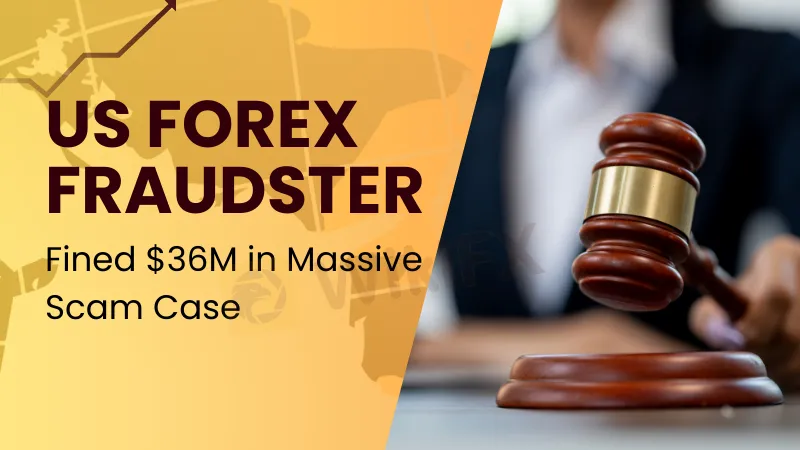简体中文
繁體中文
English
Pусский
日本語
ภาษาไทย
Tiếng Việt
Bahasa Indonesia
Español
हिन्दी
Filippiiniläinen
Français
Deutsch
Português
Türkçe
한국어
العربية
US Forex Fraudster Fined $36M in Massive Scam Case
Abstract:U.S. court orders a $36M penalty in a forex fraud case. Learn how William Koo Ichioka defrauded investors and how regulators are combating digital asset fraud.

A New York citizen has been sentenced by a US District Court to pay more than $36 million in fines and reparations for his role in a large-scale currency and digital asset fraud scam. Judge Vince Chhabria of the Northern District of California issued the verdict after the Commodity Futures Trading Commission (CFTC) inquired.
Fraudulent Scheme Targeted Forex, Digital Assets
William Koo Ichioka, a former San Francisco resident, was found guilty of defrauding investors via a fraudulent investment scheme that promised large profits on foreign currency (FX) trading and digital assets, including prominent cryptocurrencies such as Bitcoin and Ether. The CFTC discovered that Ichioka enticed investors with promises of a 10% return every 30 working days via what he referred to as a commodities investment fund.
Instead of keeping his commitments, Ichioka used the money to support an extravagant lifestyle that included expensive automobiles, high-end watches, gym memberships, and fine meals. The court ordered Ichioka to repay his duped victims $31 million in restitution and a $5 million civil monetary penalty.
Victims Defrauded of Millions
The lawsuit, which dates back to June 2023, demonstrates how Ichioka defrauded investors by using their money to pay personal bills and profit himself. His fraudulent operations finally resulted in accusations of wire fraud, aiding and abetting, and securities and commodities fraud. Ichioka pled guilty to the charges in July 2023 and was sentenced to four years in jail.

CFTC and Regulatory Action
This lawsuit is part of a larger effort by regulatory authorities such as the CFTC and the United States Securities and Exchange Commission (SEC) to combat fraud in the forex and digital asset markets. The CFTC has seen an increase in fraudulent schemes in these industries and recently released guidance to assist investors in avoiding similar frauds. The agency's war on fraud is critical for safeguarding investors and ensuring the integrity of the financial markets.
Keeping Investors Safe from Future Scams
As fraudulent schemes emerge, especially in the forex and cryptocurrency markets, investors should be watchful and cautious of claims of assured profits. Regulatory authorities have made efforts to safeguard investors, but personal vigilance remains a critical defense.
This lawsuit warns investors, legal professionals, and cryptocurrency aficionados of the hazards connected with these unpredictable markets. As scammers like Ichioka continue to prey on unwary victims, the significance of educated, careful investment cannot be stressed enough.
Final Thoughts
The $36 million punishment imposed on Ichioka demonstrates the significant repercussions of participation in fraudulent schemes and underscores the US government's continuous efforts to fight financial crime. Regulatory authorities such as the CFTC work relentlessly to protect investors and hold those participating in fraudulent activities responsible.
Stay informed on the latest news about fraud cases in the forex and digital asset markets. Visit WikiFX News for more updates and expert insights!

Disclaimer:
The views in this article only represent the author's personal views, and do not constitute investment advice on this platform. This platform does not guarantee the accuracy, completeness and timeliness of the information in the article, and will not be liable for any loss caused by the use of or reliance on the information in the article.
Read more

Scam Couple behind NECCORPO Arrested by Thai Authorities
Thai authorities have dismantled a cryptocurrency investment fraud syndicate, arresting a Chinese national and a Thai woman linked to a multi-million baht money laundering operation. The pair, who led an extravagant lifestyle funded by illicit activities, have been connected to 28 separate fraud cases, with total financial damages exceeding 30 million baht.

Unmasking the ‘Datuk’: The Anatomy of a RM638,205 Investment Scam
Authorities in Malaysia have launched an extensive investigation into a fraudulent stock investment scheme, which has resulted in losses amounting to RM638,205.

Unmasking the ‘Datuk’: The Anatomy of a RM638,205 Investment Scam
Authorities in Malaysia have launched an extensive investigation into a fraudulent stock investment scheme, which has resulted in losses amounting to RM638,205.

ATFX Enhances Trading Platform with BlackArrow Integration
ATFX integrates the BlackArrow trading platform, offering advanced tools for forex, crypto, and stocks with automation and real-time analytics for traders.
WikiFX Broker
Latest News
Germany's Election: Immigration, Economy & Political Tensions Take Centre Stage
WikiFX Review: Is IVY Markets Reliable?
Brazilian Man Charged in $290 Million Crypto Ponzi Scheme Affecting 126,000 Investors
ATFX Enhances Trading Platform with BlackArrow Integration
Become a Full-Time FX Trader in 6 Simple Steps
IG 2025 Most Comprehensive Review
SEC Drops Coinbase Lawsuit, Signals Crypto Policy Shift
Construction Datuk Director Loses RM26.6 Mil to UVKXE Crypto Scam
Should You Choose Rock-West or Avoid it?
Franklin Templeton Submitted S-1 Filing for Spot Solana ETF to the SEC on February 21
Currency Calculator






